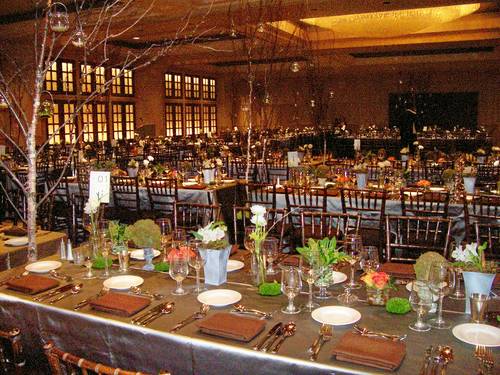WEDDINGS
The purposes of marriage as outlined in the Torah were for companionship and procreation. Even though parents in the past usually arranged marriages, the bride's consent was always asked. Today, while the methods of arranging marriages have changed somewhat, the purposes are still the same. Our craving for friendship, intimacy, and procreation drive our lives into the sphere of another person. The tie that binds these intentions together with a sense of permanence and sanctity is marriage, which Judaism embraces with a joy of purpose that is exciting and beautiful.
As a general rule of thumb, Jewish weddings can occur any day of the week. Exceptions are Shabbat, Jewish festivals, Jewish fast days, the three weeks between the 17th of Tammuz and the 9th of Av, and the sefirah period between Pesach and Shavuot (ending on Lag B'Omer), as well as the intermediary days between the holidays of Sukkot and Simchat Torah.
It is traditional for the bride to wear a white gown, head dress and veil at the ceremony. Jews from Oriental countries wear elaborate costumes richly embroidered with copper, brass and gold. It is also a well known custom for the groom to wear a kitel (a white coat like garment) along with a tallit (prayer shawl).
Before the ceremony, the groom, in the presence of witnesses, undertakes an act of kinyan (the obligations of the ketubah). This is done by taking a handkerchief or some other object from the Rabbi, lifting it and returning it. The groom and witnesses then sign the ketubah (marriage contract).
 The bride stands to the right of the groom under the chuppah and the rabbi recites the marriage blessings over a goblet of wine. Both the bride and groom then drink from the glass. The groom places the wedding ring on the forefinger of the bride's right hand and recites the marriage formula. The ketubah is then read and the seven marriage benedictions are recited by the hazzan. In most ceremonies, the rabbi invokes the "priestly blessings", and then the groom crushes the glass under his right foot as a symbol of our mourning for Jerusalem's destruction. Following this, the couple is escorted away.
The bride stands to the right of the groom under the chuppah and the rabbi recites the marriage blessings over a goblet of wine. Both the bride and groom then drink from the glass. The groom places the wedding ring on the forefinger of the bride's right hand and recites the marriage formula. The ketubah is then read and the seven marriage benedictions are recited by the hazzan. In most ceremonies, the rabbi invokes the "priestly blessings", and then the groom crushes the glass under his right foot as a symbol of our mourning for Jerusalem's destruction. Following this, the couple is escorted away.
The term chuppah, originally referred to the bridal canopy or bridal chamber, consists of a cloth spread on four poles. The cloth can be of an elaborate design, or a large tallit may be spread over the poles.
It has become universal Jewish practice to use a ring. The ring must belong to the bridegroom and be free of any precious stones. In the ceremony, the groom gives the ring to the bride as an act of acquisition and the bride, by accepting it, becomes his wife.
The ketubah is a document recording, in Aramaic, the financial obligations which the husband undertakes toward his wife in respect of their marriage. It was instituted for the purpose of protecting the woman so that the husband would not find it easy to divorce her.
Please feel free to contact us with any questions you may have.
-Rabbi Aaron Flanzraich




